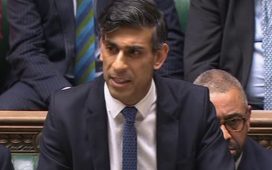One dose of a Covid vaccine appears to be giving 67% protection against the virus after three weeks, a leading expert has declared.
Real-world data on people who’ve had the jab suggested there was “no protection at all” in the first two weeks, Prof Spector said.
But this protection rose to 46% after two weeks and 67% after three to six weeks, the King’s College London scientist said.
Prof Spector revealed preliminary findings from the ZOE COVID Symptom Study app, which he leads, in a TV interview today.
It is understood the figure applies to the Pfizer vaccine, not the AstraZeneca vaccine. It refers to getting Covid at all, not just serious illness, the study team said.
Prof Spector stressed the data from around 50,000 health workers who’d had the Pfizer jab was “still preliminary” but and was “not as clear cut” as a full randomised trial.

(Image: PA)
But he also said trials can “overestimate” the benefits of the vaccine.
Prof Spector said the real-world data – drawn from health workers – suggested Britain will be in a “much better place” in two to four weeks’ time, and can begin to ease lockdown.
“If that was around the country, then we’d have really knocked this virus on the head,” he added.
And he said the controversial policy of delaying the second dose of a vaccine “looks like it’s paying off”.
Meanwhile, he told Sky News Covid-19 cases have dropped by 80% since the start of January and hospital admissions were down by 60%.
It comes as the UK looks set to hit its target of offering a first dose of the vaccine to the top four priority groups by tomorrow.
Clinically vulnerable people in England are being invited to book their Covid-19 jab as the vaccination programme moves into a new phase on Monday.
People aged 65 to 69 are also among more than one million people who have been invited to book their first dose.

(Image: ITV/REX/Shutterstock)
Boris Johnson is awaiting vital data this week on how far the vaccine reduces Covid cases – and that data will be crucial in drawing up his roadmap for easing lockdown, to be presented from February 22.
Previously a separate study had suggested the AstraZeneca vaccine could reduce transmission of Covid-19 by 67%.
Prof Spector said: “Our app is showing us some very good data on the vaccine.
“We’ve now got about a third of a million people have logged their first dose of a vaccine with us on the ZOE app.
“We’re showing very low levels of side effects and we’re showing that after three weeks, we’re getting a 67% protection against the virus – so three times less risk than you’d be getting otherwise compared to unprotected control.
“So that’s perhaps a better rate than people had thought just on a single jab.
“And so I think that, combined with the data we’re seeing, gives me a lot of reason to be optimistic that we’re going to be in a much better place in two to four weeks’ time and can start to reduce some of these restrictions.”

(Image: ZOE Symptom Study)
Prof Spector said his comments were based on a “large sample” with experts having analysed about the first 50,000 people – healthcare workers in higher risk groups.
He said: “We’re seeing a consistent fall – no protection at all in the first two weeks, and that’s important for people to notice because I think people rush out and think they’re cured. There’s high risk of infection then and we are seeing lots of cases.
“But after two weeks it drops to about 46%, and after three weeks to six weeks it’s 67%, which is really great.
“If that was around the country, then we’d have really knocked this virus on the head.”
Despite the findings, Prof Spector said he can see a “scenario” where people carry on using masks and regularly washing hands every winter into the future.
He told Sky News’ Sophy Ridge: “We’re not going to suddenly wake up one day and say we’re all cured like in the Hollywood movies and wave flags.
“It’s going to be a slow decrease out of this – we’re going to need to be cautious about new variants coming in, keeping an eye on how our vaccines are doing.
“So it makes sense to be sensible for a while longer while still keeping the vast majority of our social life, economic life and educational life going.”
He added it is “not necessarily what I want” but “I can see us carrying on using masks in certain situations. And why not have wash your hands when you go to the supermarket or you’re touching food – these are things that other countries routinely do.
“If you look at Japan they do wear masks every winter, it may not be compulsory maybe, but I think this is the sort of scenario we’re going to see.”













